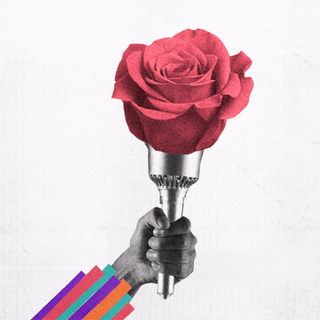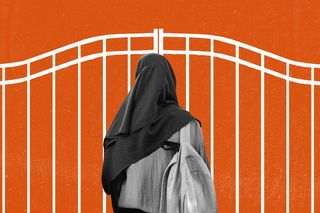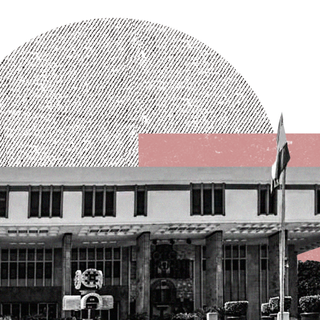
Karnataka College Restricts Students From Wearing Hijab in Classrooms
The students at a pre-university college said they were also not allowed to talk in Urdu, Arabic, or Beary languages.

At a pre-university college for women in Karnataka’s Udupi district, six Muslim women were denied entry into classes on account of wearing a hijab last week. The students say they were not given attendance for the days they came in a hijab; and were also not allowed to talk in Urdu, Arabic, or Beary languages, according to Hindustan Times.
The umbrella argument by officials is these decisions will ensure “uniformity” in the dress code within the college. In Udupi, principal Rudra Gowda told local media that the school had “no provisions to have hijab as the uniform” and thus the students were not allowed to wear them.
In another incident, a state-run college in Chikkamagaluru district also asked women to take off their headscarves in classes, while seemingly allowing them to wear the garmenton the premises. This came in response to a group of students who objected to wearing hijabs in classes, The Times of India reported on Tuesday. The college principal, in this case, said the clothing didn’t amount to a dress code violation. However, these student groups came dressed in saffron shawls as a mark of protest, thus forcing an unofficial hijab curb.
When placed within the political context, the incidents hint at a worrying pattern. The “uniform” dress code rhetoric barely disguises the Islamophobia at the core of such opposition. The ban of the veil is, by all means, global; France recently found itself at the center of contention when it voted against wearing hijabs in public. “We cannot exclude girls because they wear the headscarf…It’s really pointing a finger at them, and then [at] the culture of the child, they say to her ‘your culture, it’s not good.’ You don’t have a right to judge like that,” a Moroccan woman noted.
These curbs are both political and gendered. In 2018, for instance, a Mumbai student was barred from writing an exam because she wore a hijab. “There is very clearly sexism at play here, too; men don’t suffer the same kind of policing on their garments, religious or secular. This incident is the latest in a string of events in which women have been singled out for their clothing — be it by public humiliation or academic exclusion,” Urvashi Banerji pointed out in The Swaddle then.
Like two blades of a scissor, Islamophobia and misogyny work to suppress Muslim women. It translates into vitriol and violence in real life and online. Only recently, photos of Muslim women were auctioned on an app called “Bulli Bai” — making it the second instance in less than a year where Muslim women were targeted on another app called “Sulli Deals.” “Sulli” is a derogatory term used to refer to Muslim women by Hindutva groups.
Related on The Swaddle:
‘Sulli Deals’ Exposed the Common Roots of Misogyny and Islamophobia
“The sexual fetishization of Muslim women has been prevalent in society for a long time, and is closely related to the violence and abuse directed toward them,” Nabiya Khan wrote, explaining how misogyny and hate result in fetishizing female bodies. “This power politics and patronization of Muslim women makes the Muslim woman an ‘ideal victim.’ She is imagined in an Islamic veil, submissive, and devoid of individuality or agency, because she doesn’t fit the feminist narrative of the Savarna/elite.”
Moreover, women often bear the brunt of attacks in religious clashes due to community honor being placed with them. “The violent acts on women’s bodies were not targeted at them as individuals… A woman’s body became a site where one group tried to prove its religious supremacy over the other,” a paper noted, explaining the violence against Muslim women’s bodies during Partition.
Indubitably, this is a unique burden, made worse by putting “bans” on wearing hijab. “Because women who wear hijab and niqab are visible representations of our religion, they face a significant risk of exposure to discrimination, harassment, and attacks,” Rana Elmir noted in the Washington Post.
Moreover, the incidents come hot on the heels of growing religious fissures in Karnataka. Last month, right-wing groups attacked Christian communities, burned religious books, disrupted Christmas celebrations in seven separate incidents. In one case, individuals from a Hindutva organization threatened authorities of a convent school for hosting Christmas celebrations. Activists note the attacks grew recently as communal sentiments rose in the Bharatiya Janata Party (BJP)-ruled state.
The state became the third in the country to pass an anti-conversion bill, called the Karnataka Protection of Right to Freedom of Religion Bill 2021. It purportedly tackles the “menace” of forced conversion in the state. A similar argument has been made by right-wing groups in other cities — without evidence on their side.
These waves of violence and oppression at a macro scale are intertwined with seemingly disparate instances of curbs at a local level. Students being denied entry into classes is more than a matter of college policy; it is about students’ identity, freedom, and academic subjugation.
Saumya Kalia is an Associate Editor at The Swaddle. Her journalism and writing explore issues of social justice, digital sub-cultures, media ecosystem, literature, and memory as they cut across socio-cultural periods. You can reach her at @Saumya_Kalia.
Related


Dalit Woman Cook Fired for ‘Wrongful Appointment’ After Students Refused to Eat Her Food
